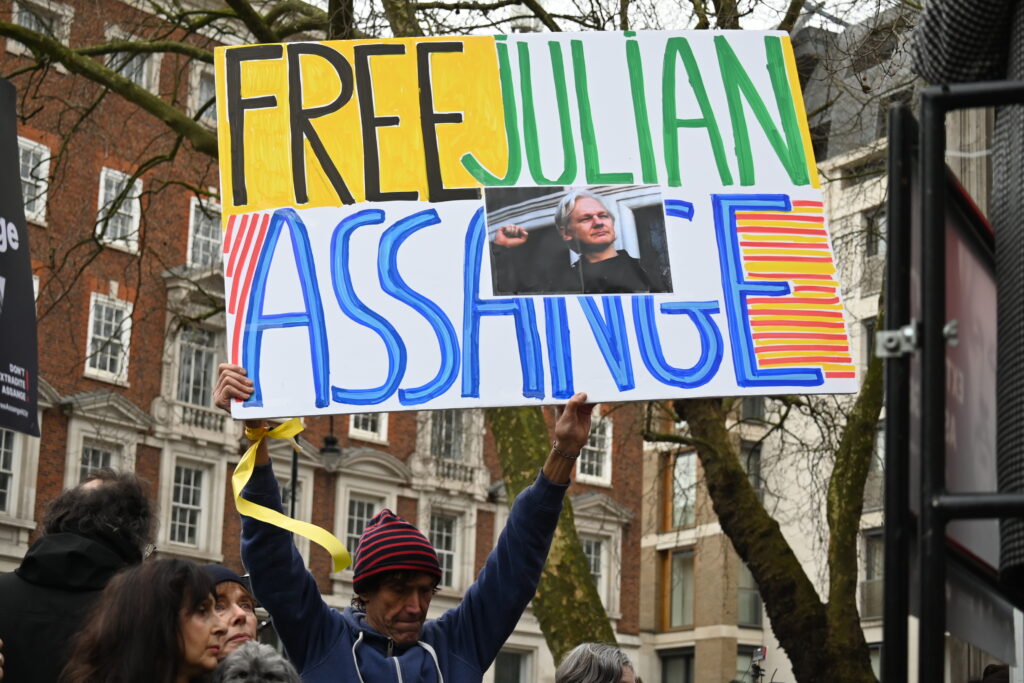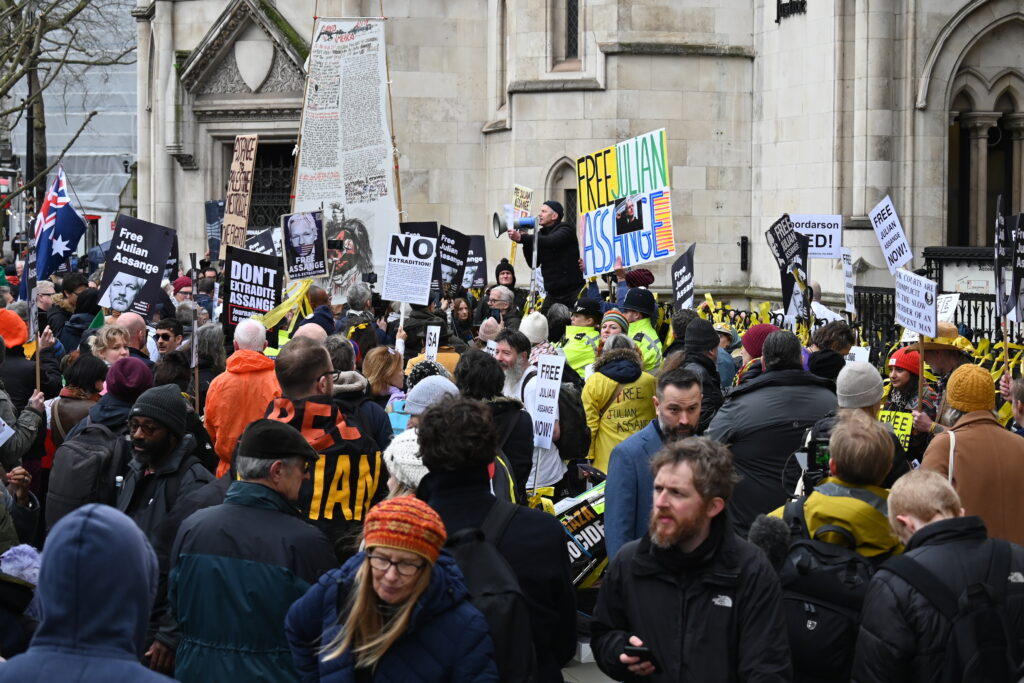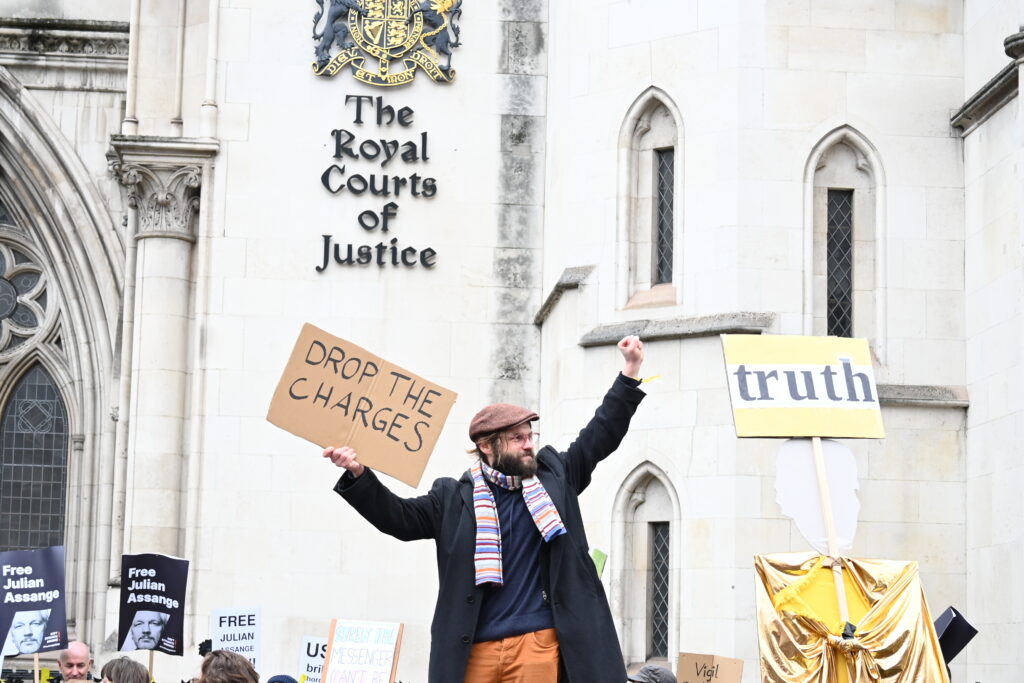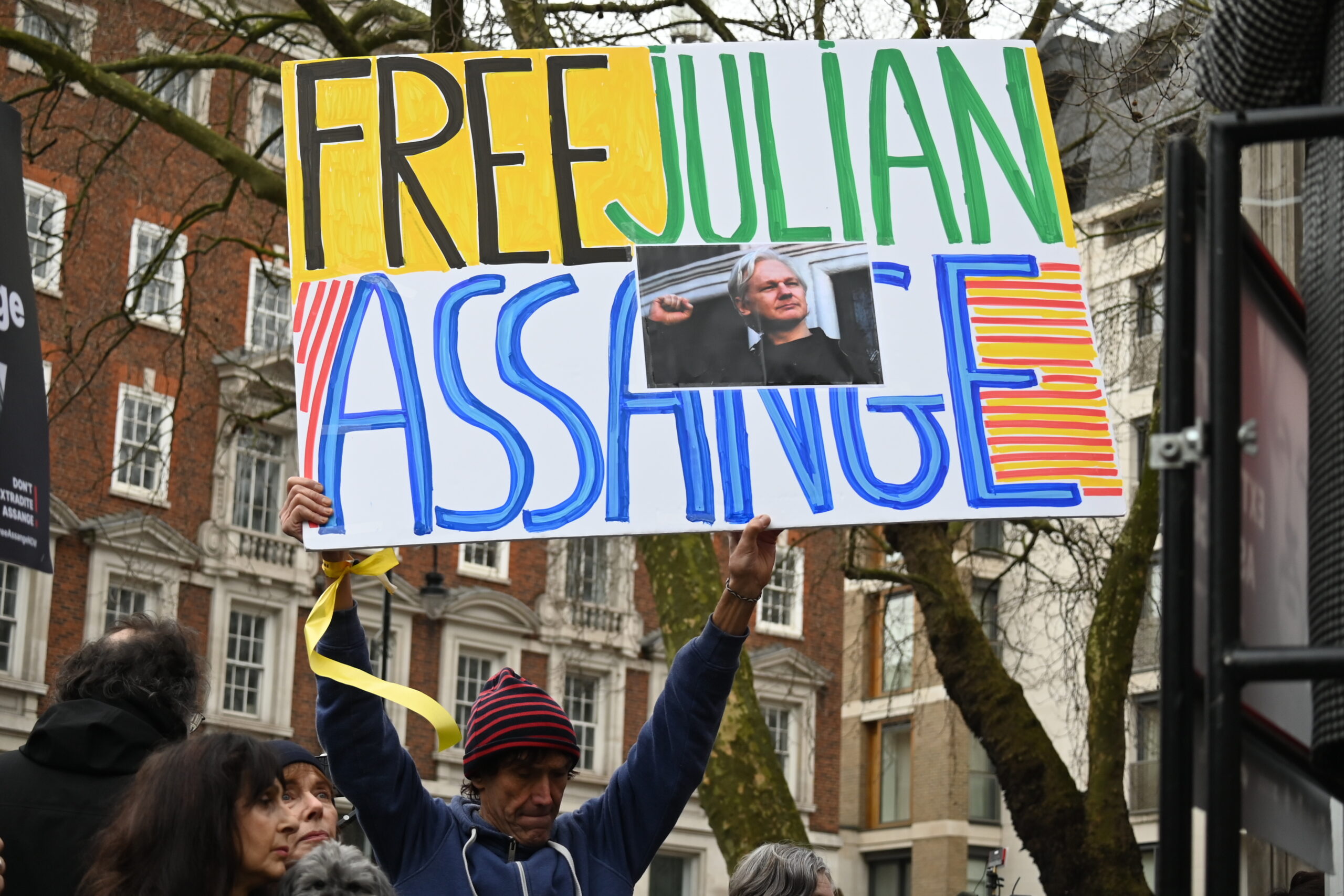Written by: Zeeshan Tirmizi, Staff Writer, Laura Mellena, Staff Writer, Ray Das, Staff Writer
Whistleblower journalist and WikiLeaks founder Julian Assange’s two-day trial began in London on 20 January at the Royal Courts of Justice. It is one of the most significant cases of press freedom of our time. The hearing will decide whether Assange is extradited to the United States and imprisoned for 175 years, potentially even facing the death penalty. Two of The Badger’s writers, Zeeshan and Laura, took to the streets to witness first-hand how the case unfolds.
The street outside the court was flooded with activists, journalists and members of the civil society. Representatives from journalist organisations such as the International Federation of Journalists, Reporters Without Borders and the National Union of Journalists joined the demonstration outside the court to support Julian Assange.
Julian Assange, with the help of former US soldier Chelsea Manning, leaked many confidential CIA documents, which exposed the US role in the Iraq and Afghanistan wars as well as the Guantanamo Bay detention camp. Assange’s investigative journalism eventually put him behind bars. After Ecuador removed Julian’s asylum while he was in the UK, the London police arrested him. Addressing the press on 20 February, Stella Assange (Julian’s wife) exclaimed: “There is no possibility of a fair trial if Julian is extradited to the United States”. She further alleged, “This case is an admission by the United States that they now criminalise investigative journalism. It’s an attack on journalism and journalists all across the world.”

British politicians attended this hearing in solidarity with Assange. Labour MP Jeremy Corbyn expressed his concerns about the deterioration of Julian’s physical and mental well-being. Corbyn called the prison “an awful place under awful conditions” and wished the prisons to be “supportive, corrective and reformative.” He also acknowledged Assange’s bravery by emphasising that “real journalists take risks”. Coventry South MP Zarah Sultana showed her support: “Revealing war crimes is not a crime; it is journalism. It is what we say when we talk about speaking truth to power.”
One protester revealed that every Monday she attends a similar protest in Brussels. After hearing that we were interviewing for a student newspaper, she expressed that she has high hopes for students bringing out the truth. “Back when I was a student,” she recalls, “we never had to ask for permission to protest for something. We would just go out and do it.” In light of the Assange trial and the government’s attempts to impose stricter laws on the recent protests against the conflict in Gaza, the protesters emphasised that “universities should be a place for free speech.”
The amount of protesters and the presence of many journalists, politicians and public figures were evidence of the importance of this case and its implications for the freedom of the press. Despite the downpour, many people attended the trial’s second day as well, which WikiLeaks named the “Global Day X”.
Assange’s life has been significantly affected by this 13-year-old case against him, evidenced by his wedding day where bride-to-be Stella Assange walked down the aisle… inside Belmarsh Prison. Even more concerning is that Assange is not allowed to attend these trials, which will decide his future. Ironically, it is Assange who is being persecuted for carrying out his journalistic duty and exposing human rights violations whilst the true criminals are still roaming free. The outcome of this trial might be announced in March but the predictions are not looking hopeful.
Years after the documents have been leaked, the US still refuses to take accountability for their atrocities, even when the whole world knows the truth. If this prosecution aims to scare journalists, then the US and UK governments are failing miserably. Even in the case of an extradition, Assange will forever remain an inspiration and his work is an example of what real journalism should be. True journalists will never be silenced.

The Story of WikiLeaks and Charges Against Assange
Inspired by Daniel Ellsberg’s release of the Pentagon Papers in 1971, Julian Assange and a small group of journalists, mathematicians and political activists co-founded WikiLeaks. As per its website, WikiLeaks describes itself as “a multinational non-profit media organisation and associated library that specialises in analysis and publication of large datasets of censored or otherwise restricted official materials involving war, spying and corruption.”
Over the years, the organisation has released several document caches and media exposing the severe human rights violations carried out by various governing bodies across the world. Their earlier exposés include US 2002 drone strikes in Yemen (which are currently ongoing) following the 11 September 2001 attacks; extrajudicial executions by Kenyan police leading to violent clashes and deaths during subsequent elections; and the 2007 release of the US Army manual of standard operating procedures overseeing Al-Qaida suspects held in Camp Delta in Guantanamo Bay, Cuba.

Most significantly, in April of 2010, WikiLeaks, released footage from Baghdad airstrikes carried out by the U.S. military on 12 July 2007. Titled Collateral Murder, the clip showed soldiers in a helicopter fatally shooting 18 civilians. This particular video was one of several files and media shared by former Army intelligence analyst Chelsea Manning who was arrested in May 2010 and court-martialed for leaking the video and downloading classified State department documents. Material shared by Chelsea Manning also includes videos of the 2009 Granai Massacre in Afghanistan carried out by the U.S. military and the exposing of Afghan war logs, with 76,910 army reports of US military intelligence detailing the undisclosed civilian casualties and grim details of the Afghan War. In October of the same year, WikiLeaks was complicit in the biggest leak in the military history of the United States: the leak of Iraq war logs. Composed of 391,831 army reports detailing the Iraq War from 2004 to 2009, it revealed the destruction and alleged war crimes of the US. Over the next several years, WikiLeaks went on to publish Guantanamo Bay files, the Syria files, the Kissinger cables, the Saudi files, Vault 7, and many more such leaks.
Assange’s activities were finally brought to government attention when, in 2012, Assange was offered political asylum in the Ecuadorian Embassy in London to avoid extradition to Sweden. This was later withdrawn in April 2019, leading to his subsequent arrest. Assange was remanded to Belmarsh Prison for 50 weeks of imprisonment on account of breaching bail. He is still there today.
At the same time, an indictment was filed against Assange, where he was charged with conspiracy to commit computer intrusion regarding his involvement with Chelsea Manning between 2010-2011.
According to the official press release from 2019 provided by the US Department of Justice (DoJ), Assange was charged with an 18-count superseding indictment which alleges that Manning and Assange conspired together to unlawfully obtain and disclose classified documents to harm US foreign relations. All charges against Assange carry a maximum sentence of 175 years. A second indictment in 2020 claims the prior indictment “broadens the scope of the conspiracy surrounding alleged computer intrusions” with which Assange was previously charged in 2018. The US DoJ further accused Assange of encouraging and recruiting other hackers to gather information for his organisation.
In 2021, the High Court of Justice in London ruled that Assange may be extradited to the US.

